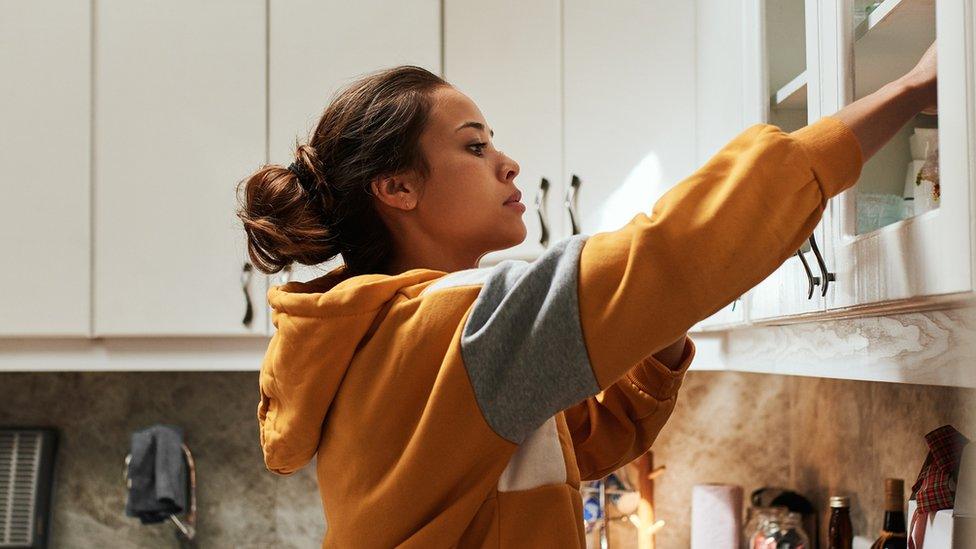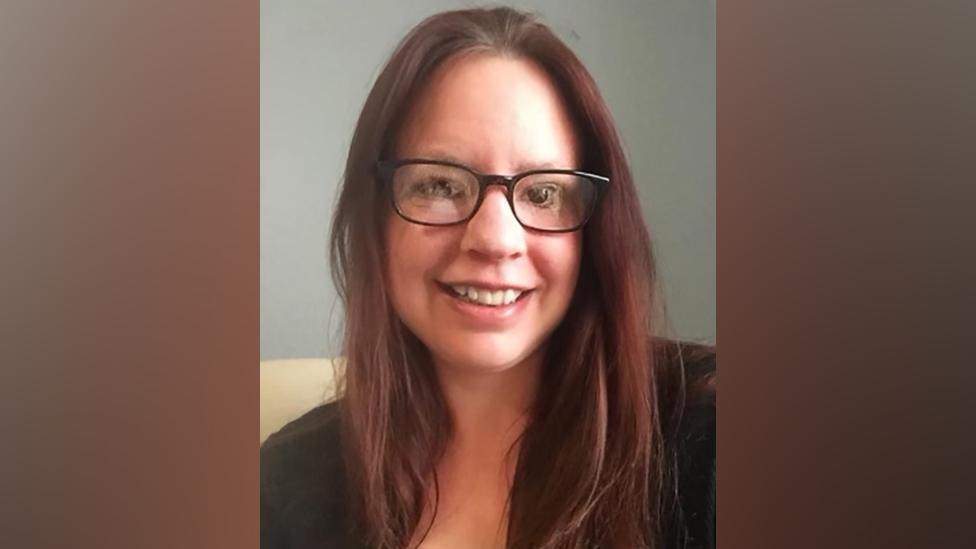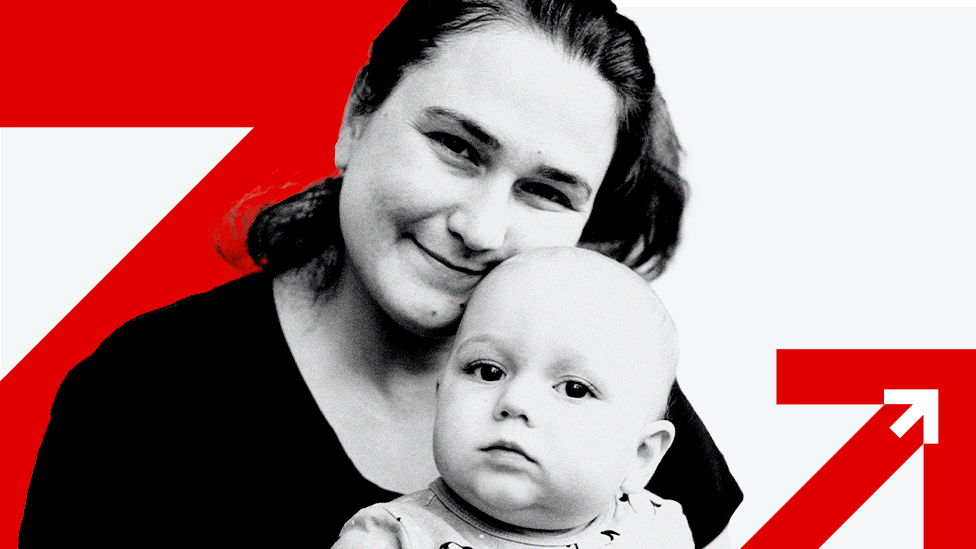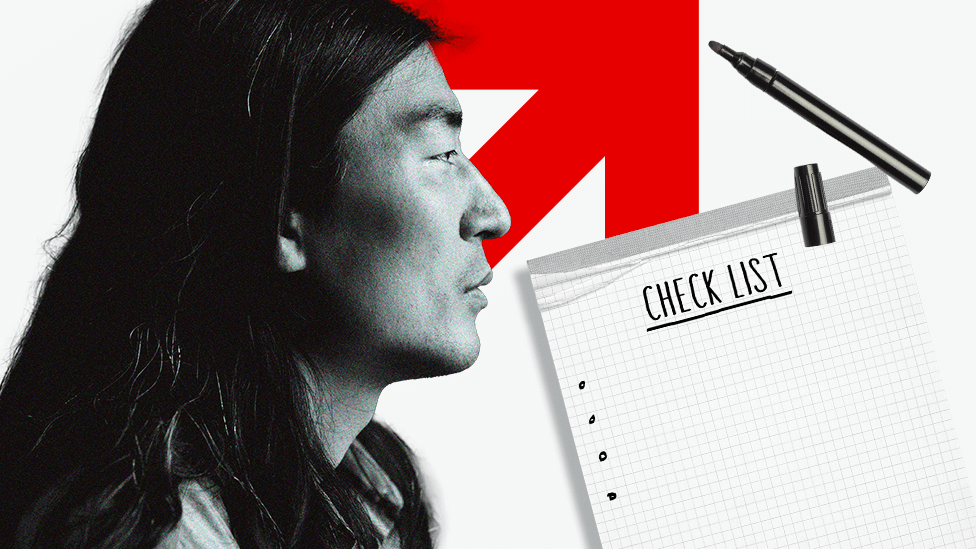Cost-of-living payments don't last - food bank
- Published

Cost-of-living payments only provide temporary respite from the use of food banks, it has been claimed.
The UK's largest food bank provider, the Trussell Trust, said there was only a short-term dip in demand for their services after payments are made.
With the next instalment going into accounts soon, it estimated the money lasted only one to three weeks.
The government said the payments were delivering "quick and much-needed help" to millions of low-income households.
How the payments work
The support scheme, launched last year, has seen a series of payments made to more vulnerable people facing the financial challenges of the soaring cost of living.
Low-income households, pensioners and some people with disabilities have benefited.
The largest current payment totals £900 and comes in three almost equal instalments paid during the course of a little over a year. That goes to people on low-incomes who receive means-tested benefits such as universal credit and pension credit.
The next payment will be made between 31 October and 19 November. The third will be made in spring next year.
Some older people and those with disabilities can be eligible as well as receiving additional payments.
Ministers said this formed part of "record" financial support worth £3,300 for families during the cost of living crisis, including support with energy bills.
'I'm left with approximately £10 after outgoings'
Charities and recipients have warned that the temporary nature of the payments are a problem.
Jenni Galliford from Hampshire has received universal credit since 2018 and is looking for work.
She said the payments were helpful, but were just a "sticking plaster" and she would rather see a permanent rise in universal credit to meet rising costs.

Jenni Galliford said the payments were just a "sticking plaster"
"It went back to the same after the payments because the cost of living is still rising," she said. "You get into a situation where you're existing day to day rather than living.
"I think you just have to spend it on the essentials and understand you are going to go back to where you were before.
"I'm left with approximately £10 after outgoings."
She also said she was worried about the situation after next spring.
"What happens when those payments stop? You've just left people who have been relying on those payments high and dry again."
Investigations
Helen Barnard, director of policy at the Trussell Trust, said the payments were not a suitable long-term solution to tackling poverty and hardship.
"Each time a cost of living payment is made we have seen a corresponding reduction in the need for food banks," she said.
"However, this respite is short-lived, as very soon afterwards we see that need increasing again with the number of emergency parcels distributed quickly rising again."
Each payment provided a respite of one to three weeks, depending on individual circumstances, the charity estimated.
Figures from YouGov for the Trussell Trust show that the majority of people who received payments in the spring of this year said that the payment had made just a little or no difference to improving their current financial situation when surveyed in August.
In addition, 80% of people who received a payment in spring had said they had already spent the relief by the time they were surveyed in August.
The Work and Pensions Committee of MPs is investigating whether the payments are supporting those most in need.
Sir Stephen Timms, who chairs the committee, said the data showed that regular benefits were now too low.
"Many families cannot survive on universal credit and so have to use food banks," he said.
The government said it was undertaking a comprehensive evaluation of the effectiveness of the payments scheme.
Debt charity StepChange said, while the payments were providing a lifeline for low-income families, it was "no surprise" they were lasting only a short amount of time as they were being swallowed up to cope with debt problems.
The government said it had raised the amount paid in benefits, citing a 10.1% increase in universal credit in April and increases in the National Living Wage.
Prime Minister Rishi Sunak recently said he recognised "things are tough right now", pointing out that halving inflation was a top priority.

How to check if you can claim a benefit
There is a guide to benefits, when you qualify and what to do if something goes wrong, from the independent MoneyHelper website, external, backed by government
Check benefits calculators run by Policy in Practice, external and charities Entitledto, external and Turn2us, external.


Sign up for our morning newsletter and get BBC News in your inbox.

Related topics
- Published15 February 2024

- Published27 June 2024
